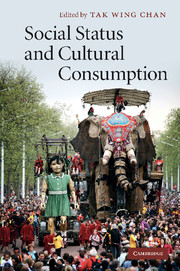Book contents
- Frontmatter
- Contents
- List of figures
- List of tables
- List of contributors
- Acknowledgments
- 1 Social status and cultural consumption
- 2 The social status scale: its construction and properties
- 3 Social stratification and musical consumption: highbrow–middlebrow in the United States
- 4 Bourdieu's legacy and the class–status debate on cultural consumption: musical consumption in contemporary France
- 5 Social status and public cultural consumption: Chile in comparative perspective
- 6 Social stratification and cultural participation in Hungary: a post-communist pattern of consumption?
- 7 Status, class and culture in the Netherlands
- 8 Social stratification of cultural consumption across three domains: music; theatre, dance and cinema; and the visual arts
- 9 Conclusion
- References
- Index
1 - Social status and cultural consumption
Published online by Cambridge University Press: 07 May 2010
- Frontmatter
- Contents
- List of figures
- List of tables
- List of contributors
- Acknowledgments
- 1 Social status and cultural consumption
- 2 The social status scale: its construction and properties
- 3 Social stratification and musical consumption: highbrow–middlebrow in the United States
- 4 Bourdieu's legacy and the class–status debate on cultural consumption: musical consumption in contemporary France
- 5 Social status and public cultural consumption: Chile in comparative perspective
- 6 Social stratification and cultural participation in Hungary: a post-communist pattern of consumption?
- 7 Status, class and culture in the Netherlands
- 8 Social stratification of cultural consumption across three domains: music; theatre, dance and cinema; and the visual arts
- 9 Conclusion
- References
- Index
Summary
The research project on which this volume reports was conceived with two main aims in mind. The first and most immediate aim was to extend our knowledge of the social stratification of cultural consumption, and to do so in a cross-national perspective. In this regard, we obviously looked to build on previous research in this area, which has in fact been steadily growing in volume over recent decades. At the same time, though, it appeared to us that in certain respects this research was subject to limitations, especially in its treatment of social stratification, both conceptually and, in turn, operationally. As a result, the large potential that such research offers for increasing our more general understanding of the form of stratification of present-day societies was not being fully realised. The second aim of our project was therefore to bring research on the social stratification of cultural consumption into a somewhat closer relationship with mainstream stratification research, and in the hope that a better appreciation might thus be gained, on the one hand, of how social inequalities in cultural consumption actually arise and are sustained and, on the other hand, of what these inequalities reveal about the larger structures of social advantage and disadvantage of which they form part.
In this introductory chapter, we first of all outline a number of arguments concerning the social stratification of cultural consumption that have emerged from previous research and theory, and seek to provide some evaluation of their present standing. We also pose, in each case, a number of questions that arise and call for further investigation.
- Type
- Chapter
- Information
- Social Status and Cultural Consumption , pp. 1 - 27Publisher: Cambridge University PressPrint publication year: 2010
- 26
- Cited by



